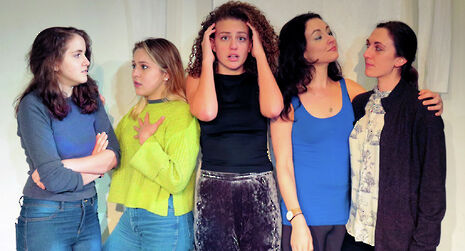The Clean House preview: ‘sadness behind the absurdity’
Sarah Ruhl’s play brings a clash of North and South America to the Corpus Playroom, combining comedy and tragedy to explore the bonds of female friendship

The setting is an American house. There is a chair, a bench, and an abstract balcony. On one side of the room is Lane, a cold and emotionally-stunted doctor, her sister standing behind her chair in passionate solidarity. On the other is a couple: Lane’s ex-husband, Charles, and the woman he left her for. There is awkward silence and even more awkward conversation. The Corpus Playroom adds to this sense of claustrophobia. These characters are trapped together in this space from which they cannot escape; a strange family split into two halves yet forced into close proximity by the intimacy of the room.
But there is a fifth character to bridge the gap. Matilde crosses the divide between the two pairs, embracing the new lover, Ana, and they ramble away together in Portuguese and Spanish. There is a thrill in their interaction, the excitement of finally being understood, and the ecstasy of someone laughing at your jokes. Victoria Zanotto (playing Matilde) tells me that this is something she is well-used to herself, being really funny in one language and not at all in another, and the cast laugh nervously. Matilde is driven in this play by the desire to tell the perfect joke, but a joke necessarily requires a laughing audience – and how can she find this if her American employees, Lane, Charles and Virginia make no effort at all to understand her?
This play is not all comedy: the comic and the tragic are balanced together within the domestic setting. Family dynamics are important in Sarah Ruhl’s play, as she explores the relationships between mother and father, sisters, husband and wife (and new wife and old). In the end, though, the cast agree, this is a play about female friendship. These four women, all with very different experiences and visions of the world, must learn to come together. Director Phoebe Segal has chosen to produce the play with an all-female cast to highlight this theme, to emphasise the feminine and deprioritise the masculine.
The Clean House provides a meeting point for the Northern and Latin American. Not only is there a collision of languages, but also a merging of culture, as the play contains elements of magical realism, a world much more normal for Matilde and Ana than for the other characters. The play becomes more and more surreal, and Segal tells me this is the hardest part of directing it: there are so many multimedia elements, where dancing, singing and projections have to be brought together. She must find a balance between the abstract and the realistic, the surreal and the relatable. Luckily, she tells me, she has found the best cast possible (cue faces lighting up around the room), who have worked hard in rehearsals to pitch the mood on the line between comedy and tragedy, to make the audience feel the sadness behind the absurdity, to make them understand why the characters weep when the lines they speak are so ridiculous. It’s a tightrope, but they walk it like skilled acrobats.
“Es como un telenovela (it’s like a soap opera)”, says Matilde towards the end of this scene. The cast and Segal jump onto this comparison. The situation might seem unrealistically complicated, the reactions and emotions romanticised or exaggerated, but as the play becomes more and more surreal you realise that this is what real life is. We should all be striving to tell the perfect joke. And we should all laugh, even if our laugh does sound like a wheeze.
The Clean House is on at the Corpus Playroom 6-10 March
 Features / Are you more yourself at Cambridge or away from it? 27 January 2026
Features / Are you more yourself at Cambridge or away from it? 27 January 2026 News / Vigil held for tenth anniversary of PhD student’s death28 January 2026
News / Vigil held for tenth anniversary of PhD student’s death28 January 2026 Interviews / Lord Leggatt on becoming a Supreme Court Justice21 January 2026
Interviews / Lord Leggatt on becoming a Supreme Court Justice21 January 2026 News / Reform candidate retracts claim of being Cambridge alum 26 January 2026
News / Reform candidate retracts claim of being Cambridge alum 26 January 2026 Comment / How Cambridge Made Me Lose My Faith26 January 2026
Comment / How Cambridge Made Me Lose My Faith26 January 2026









